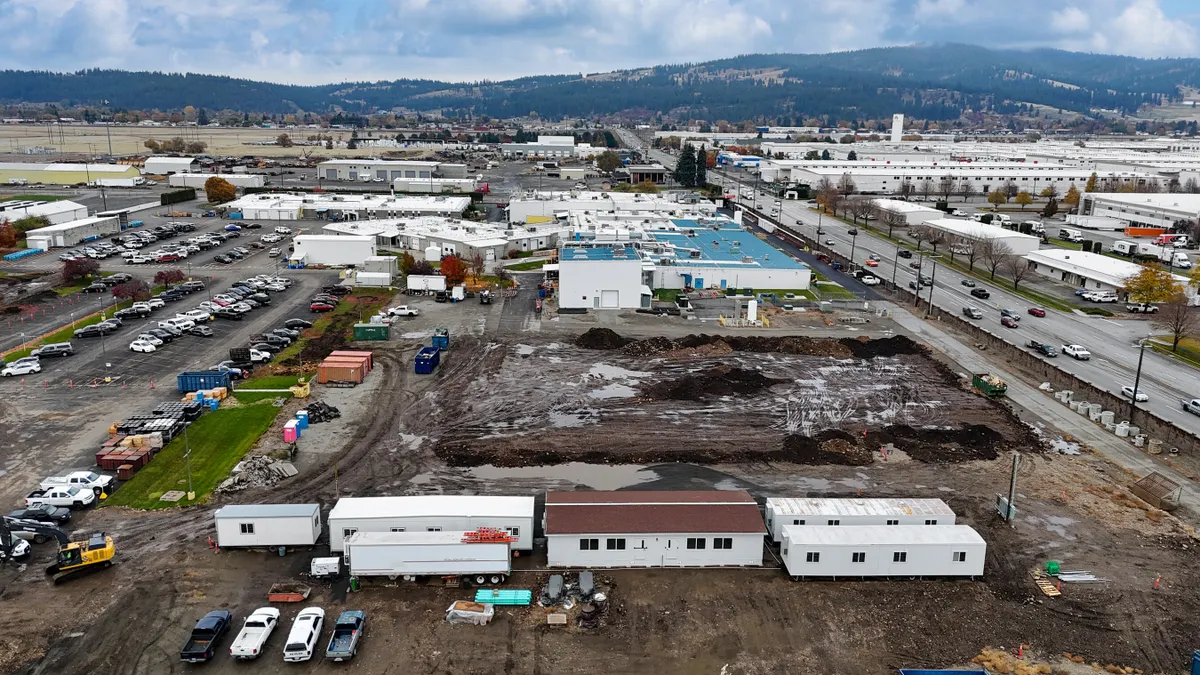After an internal accounting review and a Securities and Exchange Commission investigation delayed their release, Irving, Texas-based Fluor has announced its 2019 financial results, which show a net loss from continuing operations of $1.7 billion compared with earnings of $9 million for 2018.
Revenue from continuing operations fell nearly 6% to $14.3 billion, from $15.2 billion the prior year.
The 2019 loss includes impairment, restructuring and other exit costs of $533 million, expenses of $138 million related to the company's U.K. pension plan and $731 million related to establishing valuation allowances to reduce net deferred tax assets, according to a statement.
Full-year new awards from continuing operations and government work were $12.6 billion, and ending consolidated backlog was $31.9 billion.
In an earnings call last week, Fluor also announced that is has suspended its guidance for 2020, saying in the statement that it has experienced "a significant shift in end markets in 2020 driven by volatility in commodity prices and the global disruption from the COVID-19 pandemic."
The company is still assessing the outbreak's impact to project timelines and costs, said CEO Carlos Hernandez. "We're having conversations with our clients on the best path forward to success in this environment and are providing notices asserting our rights under change of law and force majeure provisions," he said.
He indicated that rising material costs are a problem as well. "Pressure on commodity prices has pushed a number of our pre-COVID prospects further into the future and will require further adjustment to our business model," he said.
In addition, the firm suspended its dividend and its board initiated a broader and more comprehensive analysis of its entire business model. It is on track to realize at least $100 million in annual savings by the end of the year, the statement said.
Less risk
Company officials reiterated their commitment to being more selective with the types of projects they bid on, especially in its energy and chemicals and infrastructure sectors. Hernandez announced that the firm will exit competitive engineering, procurement and construction (EPC) lump-sum bidding for energy and chemicals jobs.
"The company believes that competitively bid lump-sum projects create a transactional market where the allocation of risk is not appropriately distributed," the release said.
Going forward, Fluor will only pursue reimbursable or open-book lump-sum conversion engineering, procurement and construction prospects in its energy and chemicals work.
"We're not leaving this industry," executive chairman Alan Boeckmann said of the sector, "but we're going to play in it in a very, very different set of rules."
The company previously announced it would exit infrastructure markets in Europe and Australia and focus on select markets in the U.S. Hernandez said during the call that the company is "further refining" that approach and will no longer pursue large-scale infrastructure projects for clients where there is a history of onerous contractual terms and inadequate program management.
"As with energy and chemicals, we believe that the infrastructure business offers significant opportunities to us to be successful and deliver consistent profitability, but only under proper circumstances," he said. "Competition on lump-sum projects drives a number of unintended consequences and it creates a transactional market. In the past several years, this transactional process has disproportionately moved risk to the contractors' side of the equation. The result has been an industrywide destruction of value."
Internal investigation
Earlier this year, Fluor announced the SEC was investigating its past accounting and financial reporting, and that due to the investigation, the company would be delayed in filing conclusive full-year financial statements. The SEC review is still ongoing, Boeckmann said during the call.
In May, the company announced that it received a Justice Department subpoena seeking documents relating to charges reported by the company during the second quarter of 2019.
In addition, a special committee of independent members of the board of directors also reviewed past financial information and is sharing its findings with federal investigators.
The special committee, along with its independent external advisors and financial experts, had full access to the company’s personnel and documentation and determined the scope of its review, according to Fluor. The investigation included document collection and interviews across all Fluor EPC segments including both domestic and international.
"If I can put a finer point on the breadth of the task at hand, we reviewed projects from 2016 to 2019, and it represented the majority of the company's lump-sum portfolio based on revenue," said Boeckmann. "It's fair to say that the review was comprehensive and extremely thorough."
The committee determined there were material project-related errors resulting from the absence of timely recognition of changes in forecasted project costs, and from other errors in estimating the amount of variable consideration to be included in revenue for the company's Radford Army Ammunition project in Virginia.
"Unfortunately, this review unveiled weaknesses in pockets of our company where a few individuals did not live up to those high standards."

Carlos Hernandez
CEO, Fluor
Based on these findings, Fluor restated annual financial results for 2016, 2017 and 2018, and for each of the interim previously issued quarterly periods for 2018 and 2019. These adjustments reduced cumulative pretax earnings reported through Sept. 30, 2019, by $3.8 million.
Remediation plan
In addition, Fluor determined that its disclosure controls and procedures were not effective due to the existence of "material weaknesses."
"We pride ourselves on being an ethical company and holding our employees to the highest standards," said Hernandez. "Unfortunately, this review unveiled weaknesses in pockets of our company where a few individuals did not live up to those high standards."
To address these issues, Fluor’s remediation plan includes:
- Personnel actions "up to and including separations for personnel involved in projects associated with material weaknesses," Boeckmann said.
- Additional project monitoring procedures.
- Improved guidance on project forecasting principles.
- Updated tools and templates to achieve more standardization of project-level documentation and reporting.
- Improved internal company training on required policies and procedures.
"This 10-K [filing] represents the closing of a particularly long chapter in Fluor's history," said Hernandez. "Today, we open a new chapter in which we look forward to giving more consistent updates and moving into a regular communication cadence over the coming months."
Fluor expects to file Q1 2020 results within the next month, followed approximately four weeks later by Q2 2020 results with Q3 2020 results approximately four weeks after that.
Baird senior analyst Andrew Wittmann said in an investor note that struggling oil and gas markets could negatively affect the company going forward, but said that Fluor's experience in large-scale, multibillion-dollar megaprojects helps differentiate it from other firms. He noted that the company's balance sheet is "stronger than we'd expected and the cash burn is appearing more manageable."
"Fluor's financial strength and track record for execution have made Fluor the provider of choice and one of only a handful of companies capable of executing the largest and most technically complex engineering and construction projects located throughout the world," Wittmann wrote. "Whether this aspect of its business model is retained after its 2020 strategy review remains uncertain."
The breakdown of Fluor's 2019 profit by segment was:
- Energy & Chemicals reported a segment loss of $95 million in 2019 compared to a profit of $335 million in 2018.
- Mining & Industrial reported a segment profit of $159 million, up from $94 million in 2018.
- Infrastructure & Power reported a segment loss of $244 million compared to a loss of $30 million in 2018.
- Diversified Services, including certain operations retained from the divestment of the company's AMECO equipment rental business, reported a segment profit of $15 million in 2019, compared to $69 million a year ago.
- The "other" segment, which is comprised of NuScale Power (in which Fluor is the majority investor), the Radford plant and Warren Air Force Base project in Wyoming, reported a full year segment loss of $220 million, compared to a loss of $145 million a year ago.






















